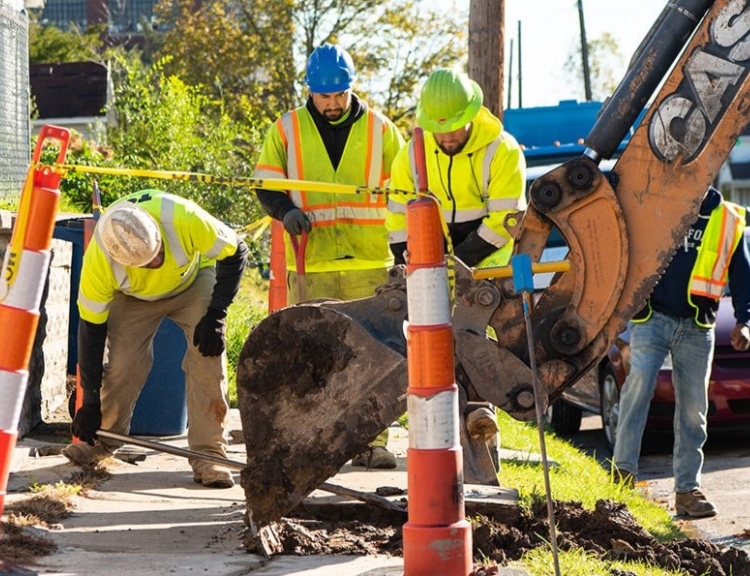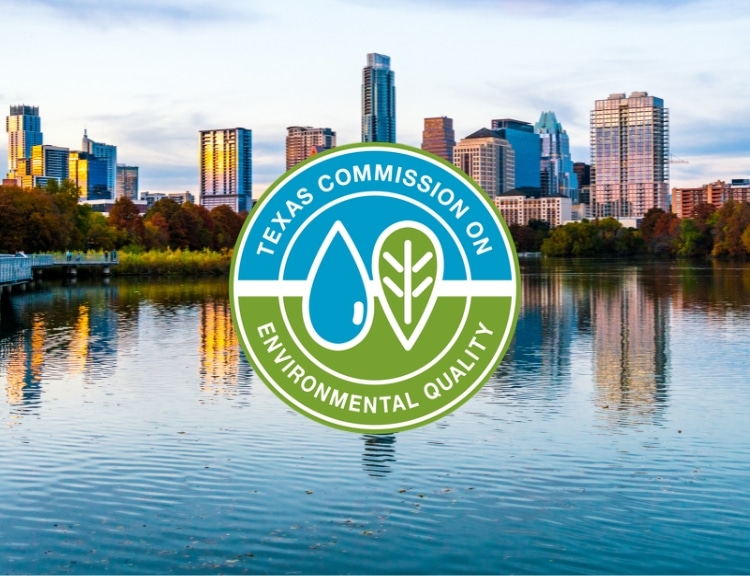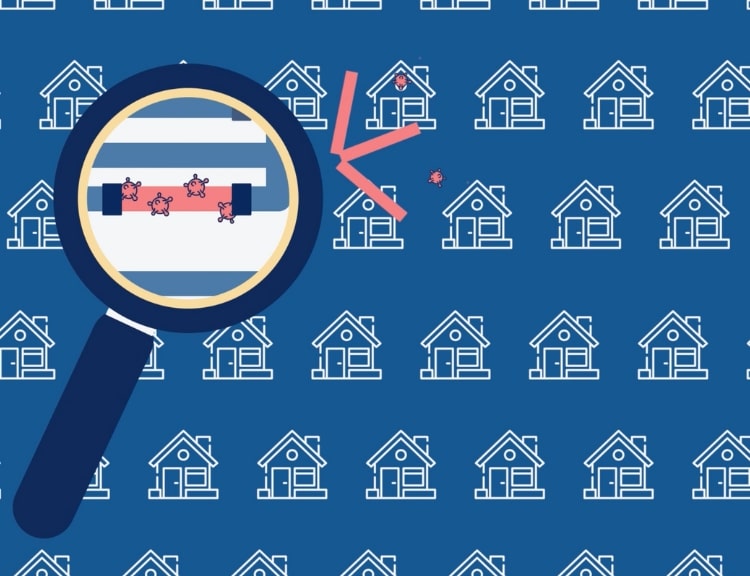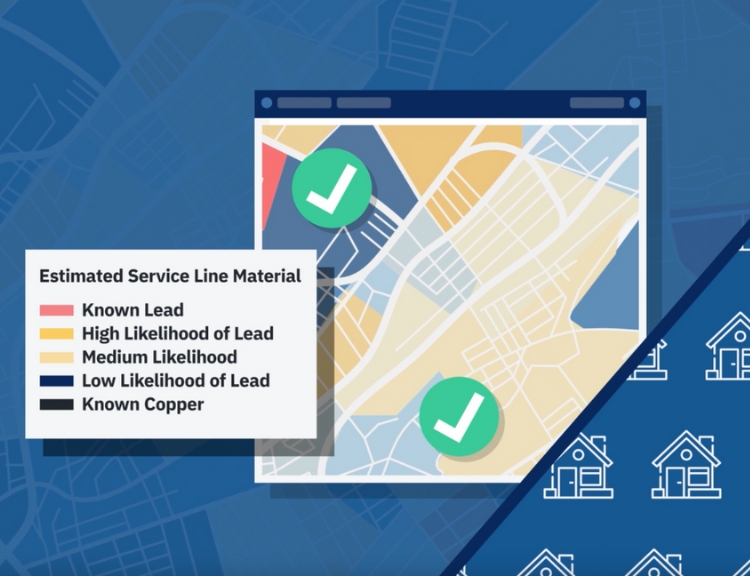BlueConduit and Google.org Announce Coalition to Help Communities Quantify and Locate Dangerous Lead Service Lines
BlueConduit will create machine learning tools to map service lines and inform communities of risks with $3 million grant from Google.org and support from WE ACT and NRDC
(Mountain View, CA) September 28, 2021 –– Today, Google.org announced $3 million in grants to BlueConduit Charitable Fund, NRDC (Natural Resources Defense Council) and WE ACT for Environmental Justice to support the equitable replacement of lead service lines.
The grants will fund the development of BlueConduit’s open source machine learning technologies, which will enable cities and towns of all sizes to quantify and map their lead service line inventory and help municipalities estimate the cost of replacing this health-threatening component of our water infrastructure. The tool will also allow water utilities to create public-facing maps that aim to strengthen public communication and help meet upcoming US EPA Revised Lead and Copper Rule requirements. Initial software will be made available in the first half of 2022. BlueConduit, WE ACT, and NRDC will work closely with community groups and municipal utilities to ensure that the tools are designed to meet their needs.
“The massive uncertainty around fundamental questions like, ‘How many lead service lines do we have across our community?’ is both costly and dangerous,” said Eric Schwartz, BlueConduit co-founder and associate professor of marketing at the University of Michigan Ross School of Business. “By providing these free tools and services and bringing together these partners, we aim to empower communities and water systems nationwide to efficiently replace these pipes, reduce the time that people are living with lead, and generate more equitable outcomes for communities across the country.”
“Lead service lines are a scourge that threatens families’ health in every state. This project will help residents learn the scope of the problem in their community and advocate for an equitable program to replace these lead pipes. No one should have to worry that the water flowing from their kitchen faucet could be contaminating their kids with lead,” said Erik D. Olson, senior strategic director for health and food at NRDC.
Service lines are pipes that connect water mains to individual homes. An NRDC survey estimated lead service lines carry drinking water to 9 to 12 million homes in the United States. Lead is a metal that can be harmful to human health even at low exposure levels, and low-income communities and communities of color bear a disproportionate burden of lead poisoning. For many communities, information about the number and location of lead service lines across their water systems is limited and not publicly accessible. This makes it challenging for residents to understand their potential risk and for cities to budget remediation costs, which can delay pipe replacement. In addition, this type of information is necessary for communities seeking access to federal funds.
“Even though lead poisoning is completely preventable, it remains a deadly threat to many Black communities, with studies showing that Black children living below the poverty line are twice as likely to suffer from lead poisoning as poor white children,” said Peggy Shepard, Co-Founder and Executive Director of WE ACT for Environmental Justice. “We look forward to working with BlueConduit, Google.org, and NRDC on this project to support local organizations in identifying and advocating for the remediation of lead pipe infrastructure that contaminates the drinking water in their local communities.”
“At Google.org we believe that when technology, innovation, and community expertise come together, we can make big strides in efficiently addressing some of our most pressing and complex challenges. And lead contamination in our drinking water is certainly one of them,” stated Brigitte Gosselink, Google.org Director of Product Impact. “We look forward to collaborating with BlueConduit, WE ACT, and NRDC to carry out this incredibly important work.”
Funding supports collaboration with WE ACT, with input from NRDC, to fund local community groups in three to-be-selected cities to facilitate increased outreach and education around service line replacement. WE ACT will administer funding and provide guidance and training to local organizations to support community engagement, education, and identifying and remediating risks of lead in water in their communities. NRDC will assist the project and local partners with technical, legal and policy elements and co-convene the partnership alongside WE ACT. BlueConduit will work with the water utility in each of the cities to support the development of their service line inventory.
The grants build on Google.org’s previous efforts to address the harmful effects of lead in community water supplies. In 2016, Google.org volunteers and a team at University of Michigan began collaborating on a project to communicate water quality information to Flint residents. The team’s work evolved into predictive modeling to locate lead service lines, which guided the city’s remediation efforts. That team later formed BlueConduit to bring their technology to more cities and, in collaboration with NRDC, created FlintPipeMap.org, an interactive map that uses machine learning to give residents information on lead in their water service lines.
+++
About Google.org
Google.org, Google’s philanthropy, supports nonprofits that address humanitarian issues and apply scalable, data-driven innovation to solving the world’s biggest challenges. We accelerate their progress by connecting them with a unique blend of support that includes funding, products, and technical expertise from Google volunteers. We engage with these believers-turned-doers who make a significant impact on the communities they represent, and whose work has the potential to produce meaningful change. We want a world that works for everyone—and we believe technology and innovation can move the needle.
About BlueConduit
BlueConduit Charitable Fund is receiving the funding for this project. BlueConduit Charitable Fund is a fiscally sponsored project of the Windward Fund and contracts with BlueConduit to perform its charitable work. BlueConduit is a water analytics company that has developed cutting-edge, predictive machine learning methods to locate lead service lines, empowering local officials with the information to efficiently remove those pipes. Our model enables utilities to focus their resources on digging where the lead is and accelerating the removal of this significant health concern and save millions of dollars in avoided digs. Since 2016, we have worked with more than 50 municipalities and inventoried nearly 1 million service lines, which serve more than 2 million people.
About WE ACT
WE ACT for Environmental Justice is a Northern Manhattan membership-based organization whose mission is to build healthy communities by ensuring that people of color and/or low-income residents participate meaningfully in the creation of sound and fair environmental health and protection policies and practices. WE ACT has offices in New York and Washington, D.C. Visit us at weact.org and follow us on Facebook, Twitter, and Instagram.
About NRDC
NRDC (Natural Resources Defense Council) is an international nonprofit environmental organization with more than 3 million members and online activists. Since 1970, our lawyers, scientists, and other environmental specialists have worked to protect the world’s natural resources, public health, and the environment. NRDC has offices in New York City, Washington, D.C., Los Angeles, San Francisco, Chicago, Bozeman, MT, and Beijing. Visit us at www.nrdc.org and follow us on Twitter @NRDC.





